Britain's Queen Elizabeth II has symbolically led the lighting of the principal Platinum Jubilee beacon to end the first day of commemorations marking her 70-year-reign.
The monarch's late-night appearance at Windsor Castle rounded off the start to festivities which saw the queen take to the Buckingham Palace balcony surrounded by her family.
But it was also announced the head of state would miss a National Service of Thanksgiving at St Paul's Cathedral in London after experiencing "discomfort" during events today.
She is skipping the service "with great reluctance", the palace said.
She is believed to have experienced episodic mobility issues during today's events.
It is understood the decision was considered regrettable but sensible due to the length of the journey, and time involved and the physical demands the service would require.
The statement issued this evening said: "The Queen greatly enjoyed today's Birthday Parade and flypast but did experience some discomfort.
"Taking into account the journey and activity required to participate in tomorrow's National Service of Thanksgiving at St Paul's Cathedral, Her Majesty with great reluctance has concluded that she will not attend.
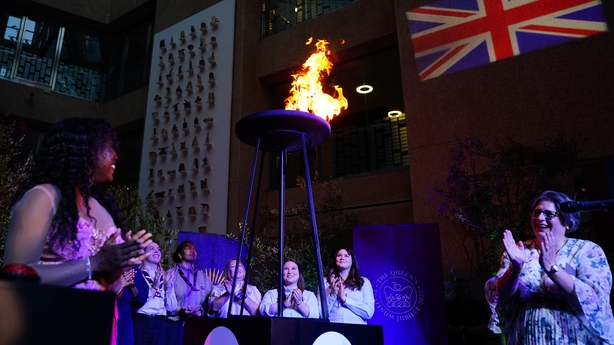
"The Queen is looking forward to participating in tonight's beacon lighting event at Windsor Castle and would like to thank all those who made today such a memorable occasion."
The Queen joined members of her family on the balcony at Buckingham Palace to take a salute of her soldiers returning from Trooping the Colour.
Tens of thousands of people lined the streets of London to celebrate the Queen's Platinum Jubilee and kick off four days of festivities, parties and parades to mark her record-breaking 70 years on the British throne.
Millions of people across Britain and the world are expected to join the festivities in honour of the 96-year-old, who has reigned for longer than any of her predecessors, the government said.
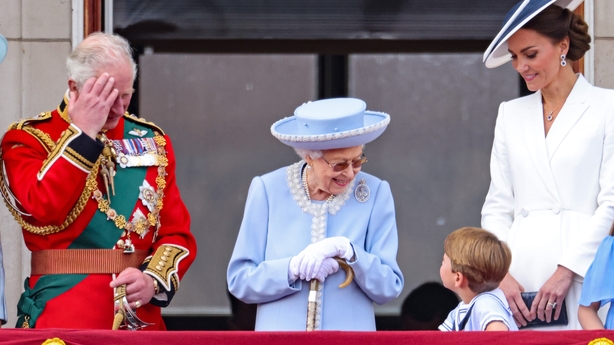
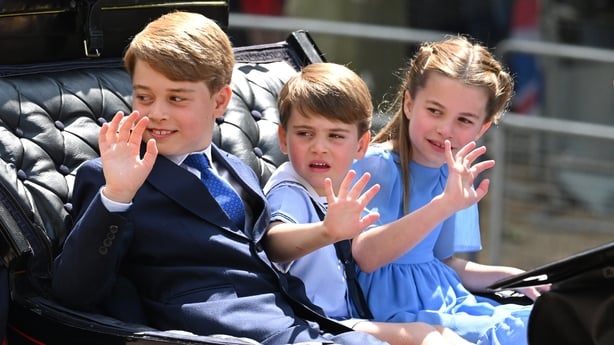
"Thank you to everyone who has been involved in convening communities, families, neighbours and friends to mark my Platinum Jubilee, in the United Kingdom and across the Commonwealth," the Queen said in a statement.
"I continue to be inspired by the goodwill shown to me, and hope that the coming days will provide an opportunity to reflect on all that has been achieved during the last 70 years, as we look to the future with confidence and enthusiasm."
During the sunny afternoon, families and friends gathered on the main grand roads running up to Buckingham Palace, cheering the regimental marching bands, waving Union flags and wearing paper crowns. Many had slept on the streets to secure a good position.
Others descended on nearby parks to enjoy picnics and follow the proceedings on big screens.
At least two people briefly caused a disturbance by running out in front of marching soldiers on the Mall boulevard before they were dragged away by police.
Police said a number of arrests had been made for public order offences.
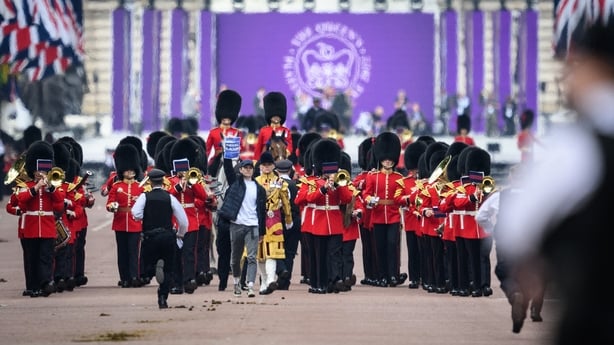
We need your consent to load this rte-player contentWe use rte-player to manage extra content that can set cookies on your device and collect data about your activity. Please review their details and accept them to load the content.Manage Preferences
In a sign of her advancing years and recent "episodic mobility" issues, which have led her to cancel some engagements, the Queen's personal involvement in the events will be somewhat limited compared with previous major gatherings.
The celebrations began with the Trooping the Colour military parade in central London, and for the first time the Queen took the salute from the 1,500 soldiers and officers from the balcony of Buckingham Palace.
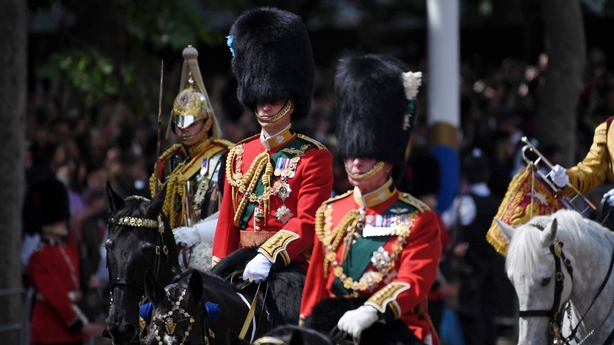
The arrival of the first senior royals in a carriage - Kate, the wife of Prince William, her three young children and Camilla, the wife of heir to the throne Prince Charles - were met with loud cheers.
Charles, William and the Queen's daughter Anne arrived on horseback.
Other senior royals will carry out other ceremonial duties on the Queen's behalf, although much attention will be focused on those who will not be present.
Second son Prince Andrew, 62, who settled a US lawsuit in February in which he was accused of sexually abusing a woman when she was underage, will also miss tomorrow's Jubilee service of thanksgiving after testing positive for Covid.
Her grandson Prince Harry, now living in Los Angeles with his wife Meghan, watched the parade but was absent when the royal family gathered on the palace balcony to watch a fly-past by modern and historic Royal Air Force planes after the parade.
There were also gun salutes in London, across Britain and from Royal Navy ships at sea at midday.
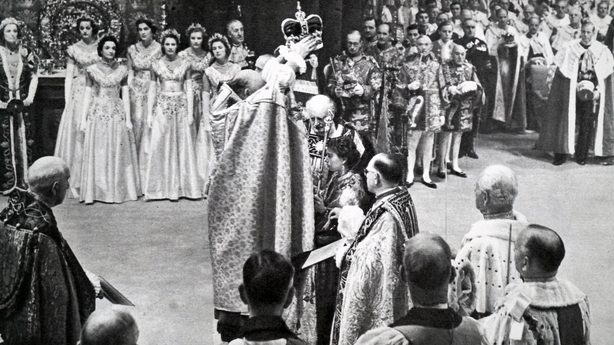
At nightfall, the Queen will be at Windsor Castle to take part in the ceremony to light more than 3,000 beacons across the UK and the Commonwealth of 54 nations that she heads.
Beacons will be lit at Northern Ireland's highest peak and most westerly town, Enniskillen, Co Fermanagh, later as part of the jubilee celebrations.
Elizabeth was a 25-year-old princess when she succeeded her father king George VI in 1952, bringing a rare touch of glamour to a battered nation still enduring food rations after World War II.
Seventy years on, she is now the only monarch most Britons have ever known, becoming an enduring figurehead through often troubled times.
Britain's first Platinum Jubilee will see street parties, pop concerts and parades until Sunday in potentially the last major public celebration of the Queen's long reign.
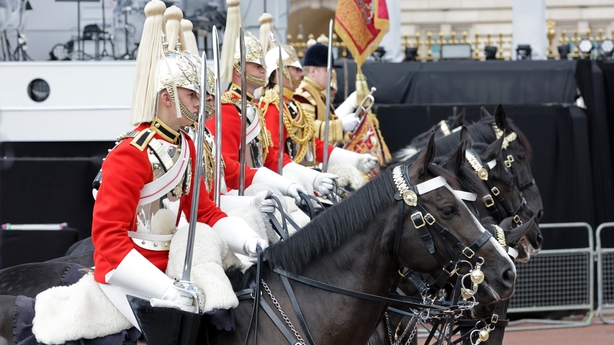
The Queen's planned attendance at horseracing showcase The Derby on Saturday is also off.
She could yet put in a final appearance - again from the palace balcony - on Sunday, at the climax of a huge public pageant involving 6,000 performers.
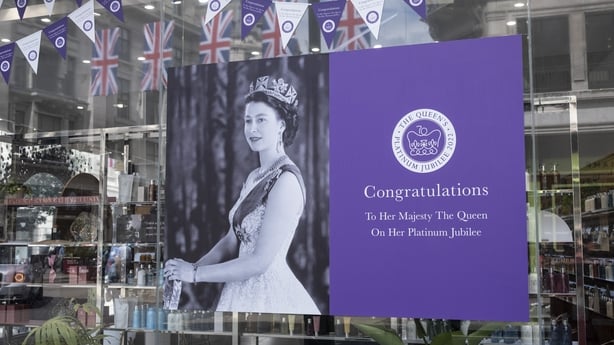
In April last year, she lost her husband of 73 years, Prince Philip, and was forced to sit alone at his funeral due to coronavirus restrictions.
Since then, she has struggled with her health.
The largest party celebrating the Queen's record-breaking 70-year reign is set to be Morecambe Bay's Big Jubilee Lunch on Sunday, which is hosting around 5,000 people at over 500 tables overlooking the sea.
At the opposite end of the country, an LED beacon will be illuminating the south coast from Hove Esplanade in Brighton, East Sussex.
An estimated 10 million people plan to celebrate the Queen's Platinum Jubilee, according to the Department for Digital, Culture, Media and Sport (DCMS).
The Department also said that more than 70,000 'Big Jubilee Lunches' and 200,000 more local events have been planned across the four nations.
Many official events will also be collecting money for charities throughout the bank holiday.
More than 600 Big Jubilee Lunches are planned in around 80 countries - from Greenland to New Zealand.
Attention is increasingly turning to the succession, and the monarchy's future at home and in the 14 other Commonwealth countries where the Queen is also head of state.
Her approval rating among Britons remains high at 75%, according to a poll by YouGov published Wednesday, but Charles is only on 50%.
A total of 62% still want a monarchy, although younger people are split, with 33% in favour, and 31% wanting a republic.
Only 39% said they thought there would still be a monarch in 100 years' time.
President Higgins sends well wishes
President Michael D Higgins said today that he wrote to Queen Elizabeth to wish her well on her Platinum Jubilee.
Speaking at the Bord Bia Bloom festival in Dublin, he said Queen Elizabeth was a very gracious lady anytime he met her and 70 years is a very significant contribution.
The President said that relationships between Ireland and Britain are "unnecessarily difficult" and he wished they were not so.
He added that nobody benefits and we should try and see our way past current difficulties.
Additional reporting PA and Joe Mag Raollaigh

